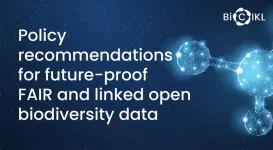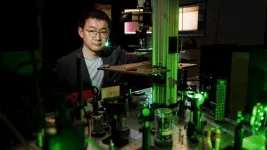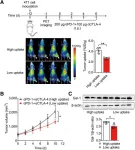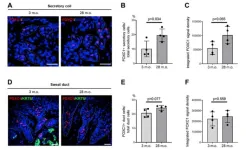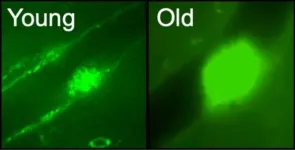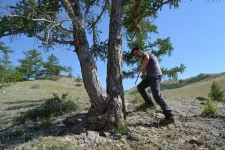(Press-News.org) Within the Biodiversity Community Integrated Knowledge Library (BiCIKL) project, 14 European institutions from ten countries, spent the last three years elaborating on services and high-tech digital tools, in order to improve the findability, accessibility, interoperability and reusability (FAIR-ness) of various types of data about the world’s biodiversity. These types of data include peer-reviewed scientific literature, occurrence records, natural history collections, DNA data and more.
By ensuring all those data are readily available and efficiently interlinked to each other, the project consortium’s intention is to provide better tools to the scientific community, so that it can more rapidly and effectively study, assess, monitor and preserve Earth’s biological diversity in line with the objectives of the likes of the EU Biodiversity Strategy for 2030 and the European Green Deal. Their targets require openly available, precise and harmonised data to underpin the design of effective measures for restoration and conservation, reminds the BiCIKL consortium.
Since 2021, the project partners at BiCIKL have been working together to elaborate existing workflows and links, as well as create brand new ones, so that their data resources, platforms and tools can seamlessly communicate with each other, thereby taking the burden off the shoulders of scientists and letting them focus on their actual mission: paving the way to healthy and sustainable ecosystems across Europe and beyond.
Now that the three-year project is officially over, the wider scientific community is yet to reap the fruits of the consortium’s efforts. In fact, the end of the BiCIKL project marks the actual beginning of a European- and global-wide revolution in the way biodiversity scientists access, use and produce data. It is time for the research community, as well as all actors involved in the study of biodiversity and the implementation of regulations necessary to protect and preserve it, to embrace the lessons learned, adopt the good practices identified and build on the knowledge in existence.
This is why amongst the BiCIKL’s major final research outputs, there are two Policy Briefs meant to summarise and highlight important recommendations addressed to key policy makers, research institutions and funders of research. After all, it is the regulatory bodies that are best equipped to share and implement best practices and guidelines.
Most recently, the BiCIKL consortium published two particularly important policy briefs, both addressed to the likes of the European Commission’s Directorate-General for Environment; the European Environment Agency; the Joint Research Centre; as well as science and policy interface platforms, such as the EU Biodiversity Platform; and also organisations and programmes, e.g. Biodiversa+ and EuropaBON, which are engaged in biodiversity monitoring, protection and restoration. The policy briefs are also to be of particular use to national research funds in the European Union.
One of the newly published policy briefs, titled “Uniting FAIR data through interlinked, machine-actionable infrastructures”, highlights the potential benefits derived from enhanced connectivity and interoperability among various types of biodiversity data. The publication includes a list of recommendations addressed to policy-makers, as well as nine key action points. Understandably, amongst the main themes are those of wider international cooperation; inclusivity and collaboration at scale; standardisation and bringing science and policy closer to industry. Another major outcome of the BiCIKL project: the Biodiversity Knowledge Hub portal is noted as central to many of these objectives and tasks in its role of a knowledge broker that will continue to be maintained and updated with additional FAIR data-compliant services as a living legacy of the collaborative efforts at BiCIKL.
The second policy brief, titled “Liberate the power of biodiversity literature as FAIR digital objects”, shares key actions that can liberate data published in non-machine actionable formats and non-interoperable platforms, so that those data can also be efficiently accessed and used; as well as ways to publish future data according to the best FAIR and linked data practices. The recommendations highlighted in the policy brief intend to support decision-making in Europe; expedite research by making biodiversity data immediately and globally accessible; provide curated data ready to use by AI applications; and bridge gaps in the life cycle of research data through digital-born data. Several new and innovative workflows, linkages and integrative mechanisms and services developed within BiCIKL are mentioned as key advancements created to access and disseminate data available from scientific literature.
While all policy briefs and factsheets - both primarily targeted at non-expert decision-makers who play a central role in biodiversity research and conservation efforts - are openly and freely available on the project’s website, the most important contributions were published as permanent scientific records in a BiCIKL-branded dedicated collection in the peer-reviewed open-science journal Research Ideas and Outcomes (RIO). There, the policy briefs are provided as both a ready-to-print document (available as supplementary material) and an extensive academic publication.
Currently, the collection: “Towards interlinked FAIR biodiversity knowledge: The BiCIKL perspective” in the RIO journal contains 60 publications, including policy briefs, project reports, methods papers, conference abstracts, demonstrating and highlighting key milestones and project outcomes from along the BiCIKL’s journey in the last three years. The collection also features over 15 scientific publications authored by people not necessarily involved in BiCIKL, but whose research uses linked open data and tools created in BiCIKL. Their publications were published in a dedicated article collection in the Biodiversity Data Journal.
***
Visit the Biodiversity Community Integrated Knowledge Library (BiCIKL) project’s website at: https://bicikl-project.eu/.
Don’t forget to also explore the Biodiversity Knowledge Hub (BKH) for yourself at: https://biodiversityknowledgehub.eu/ and watch the BKH’s introduction video.
Highlights from the BiCIKL project are also accessible on Twitter/X from the project’s hashtag: #BiCIKL_H2020 and handle: @BiCIKL_H2020.
END
How to ensure biodiversity data are FAIR, linked, open and future-proof? Policy makers and research funders receive expert recommendations from the BiCIKL project
Now concluded Horizon 2020-funded project BiCIKL shares lessons learned from a three-year European-wide collaboration aligning with the goals of the EU Biodiversity Strategy for 2030
2024-05-14
ELSE PRESS RELEASES FROM THIS DATE:
Lessons in chemistry: Guo aims at fundamental understanding of emerging semiconductor material
2024-05-14
Metal halide perovskites have emerged in recent years as a low-cost, highly efficient semiconducting material for solar energy, solid-state lighting and more. Despite their growing use, a fundamental understanding of the origins of their outstanding properties is still lacking. A Husker scientist is aiming to find answers that could lead to the development of new materials and new applications.
Yinsheng Guo, assistant professor of chemistry at the University of Nebraska–Lincoln, also wants to transform how physical chemistry is taught to undergraduate and graduate students, who often struggle to understand and apply what ...
Newly identified PET biomarker predicts success of immune checkpoint blockade therapy
2024-05-14
Reston, VA—The protein galectin-1 (Gal-1) has been identified as a new PET imaging biomarker for immune checkpoint blockade (ICB) therapy, allowing physicians to predict the tumor responses before beginning treatment. Information garnered from Gal-1 PET imaging could also be used to facilitate patient stratification and optimize immunotherapy, enabling targeted interventions and improving patient outcomes. This research was published in the May issue of The Journal of Nuclear Medicine.
Immunotherapies, such as ICB, have produced promising clinical ...
Age-associated gene expression changes in mouse sweat glands
2024-05-14
“In this study, we first obtained evidence that, in mouse, aging primarily reduced the number of active sweat glands.”
BUFFALO, NY- May 14, 2024 – A new research paper was published in Aging (listed by MEDLINE/PubMed as "Aging (Albany NY)" and "Aging-US" by Web of Science) Volume 16, Issue 8, entitled, “Characterization of age-associated gene expression changes in mouse sweat glands.”
Evaporation of sweat on the skin surface is the major mechanism for dissipating heat in humans. The secretory capacity of sweat glands (SWGs) ...
26-year-old heart transplant and stroke survivor named national champion for women’s health
2024-05-14
DALLAS, May 13, 2024 — Fewer than half of all women are aware that heart disease is their leading cause of death. That is why the American Heart Association, celebrating one hundred years of lifesaving service, created its community-based Woman of Impact™ initiative as an outgrowth of its year-round Go Red for Women® activist movement. The movement spotlights the lack of awareness and the clinical care gaps in women’s heart health. This year’s National Winner of the Go Red for Women 2024 Woman of Impart initiative is a 26-year-old heart transplant recipient, stroke survivor and American Heart Association local volunteer, Hana Hooper from Puget ...
Virus that causes COVID-19 can penetrate blood-retinal-barrier and could damage vision
2024-05-14
The blood-retinal barrier is designed to protect our vision from infections by preventing microbial pathogens from reaching the retina where they could trigger an inflammatory response with potential vision loss. But researchers at the University of Missouri School of Medicine have discovered the virus that causes COVID-19 can breach this protective retinal barrier with potential long-term consequences in the eye.
Pawan Kumar Singh, PhD, an assistant professor of ophthalmology, leads a team researching new ways to prevent and treat ocular infectious diseases. Using a humanized ...
Stem cells provide new insight into genetic pathway of childhood cancer
2024-05-14
Scientists have discovered a new insight into the genetic pathway of childhood cancer, offering new hope for tailored treatments.
Researchers from the University of Sheffield have created a stem cell model designed to investigate the origins of neuroblastoma, a cancer primarily affecting babies and young children.
Neuroblastoma is the most common childhood tumour occurring outside the brain, affecting the lives of approximately 600 children in the European Union and the United Kingdom each year.
Until now, studying genetic changes and their role in neuroblastoma initiation has been challenging due to the lack of suitable laboratory ...
Distinct population of ‘troublemaker’ platelet cells appear with aging, lead to blood clotting, disease
2024-05-14
As people age, they become more prone to blood clotting diseases, when blood cells called platelets clump together when they don’t need to and can cause major issues such as strokes and cardiovascular disease. For decades, scientists have studied why older people’s blood cells behave in this way, using their insights to develop the myriad of blood-thinning drugs now on the market for treating the leading cause of death in the United States.
Now, UC Santa Cruz Professor of Biomolecular Engineering Camilla Forsberg and her research group have ...
2023 was the hottest summer in two thousand years
2024-05-14
Researchers have found that 2023 was the hottest summer in the Northern Hemisphere in the past two thousand years, almost four degrees warmer than the coldest summer during the same period.
Although 2023 has been reported as the hottest year on record, the instrumental evidence only reaches back as far as 1850 at best, and most records are limited to certain regions.
Now, by using past climate information from annually resolved tree rings over two millennia, scientists from the University of Cambridge and the Johannes Gutenberg University Mainz have shown how exceptional the summer of 2023 was.
Even allowing for natural climate variations over hundreds of years, 2023 was still ...
Analysis of previously unstudied areas of the human genome suggests people with more copies of ribosomal DNA have higher risks of developing disease
2024-05-14
UNDER STRICT EMBARGO UNTIL 4PM GMT (11AM ET) on 14 May 2024.
Peer reviewed | Observational | People
Ribosomal DNA (rDNA) is present in hundreds of copies in the genome, but has not previously been part of genetic analyses. A new study of 500,000 individuals indicates that people who have more copies of rDNA are more likely to develop inflammation and diseases during their lifetimes.
Standard genetic analysis techniques have not studied areas of the human genome that are repetitive, such as ribosomal ...
Study reveals mixed public opinion on polygenic embryo screening for IVF
2024-05-14
Three out of four U.S. adults support the use of emerging technologies that estimate a future child’s likelihood of developing health conditions influenced by multiple genes — such as diabetes, heart disease, and depression — before an embryo is implanted during in vitro fertilization (IVF), according to a new public opinion survey led by researchers at Harvard Medical School.
Results of the survey, to be published May 14 in JAMA Network Open, underscore the need for public education and conversation about the positive ...
LAST 30 PRESS RELEASES:
Study reveals insights about brain regions linked to OCD, informing potential treatments
Does ocean saltiness influence El Niño?
2026 Young Investigators: ONR celebrates new talent tackling warfighter challenges
Genetics help explain who gets the ‘telltale tingle’ from music, art and literature
Many Americans misunderstand medical aid in dying laws
Researchers publish landmark infectious disease study in ‘Science’
New NSF award supports innovative role-playing game approach to strengthening research security in academia
Kumar named to ACMA Emerging Leaders Program for 2026
AI language models could transform aquatic environmental risk assessment
New isotope tools reveal hidden pathways reshaping the global nitrogen cycle
Study reveals how antibiotic structure controls removal from water using biochar
Why chronic pain lasts longer in women: Immune cells offer clues
Toxic exposure creates epigenetic disease risk over 20 generations
More time spent on social media linked to steroid use intentions among boys and men
New study suggests a “kick it while it’s down” approach to cancer treatment could improve cure rates
Milken Institute, Ann Theodore Foundation launch new grant to support clinical trial for potential sarcoidosis treatment
New strategies boost effectiveness of CAR-NK therapy against cancer
Study: Adolescent cannabis use linked to doubling risk of psychotic and bipolar disorders
Invisible harms: drug-related deaths spike after hurricanes and tropical storms
Adolescent cannabis use and risk of psychotic, bipolar, depressive, and anxiety disorders
Anxiety, depression, and care barriers in adults with intellectual and developmental disabilities
Study: Anxiety, gloom often accompany intellectual deficits
Massage Therapy Foundation awards $300,000 research grant to the University of Denver
Gastrointestinal toxicity linked to targeted cancer therapies in the United States
Countdown to the Bial Award in Biomedicine 2025
Blood marker from dementia research could help track aging across the animal world
Birds change altitude to survive epic journeys across deserts and seas
Here's why you need a backup for the map on your phone
ACS Central Science | Researchers from Insilico Medicine and Lilly publish foundational vision for fully autonomous “Prompt-to-Drug” pharmaceutical R&D
Increasing the number of coronary interventions in patients with acute myocardial infarction does not appear to reduce death rates
[Press-News.org] How to ensure biodiversity data are FAIR, linked, open and future-proof? Policy makers and research funders receive expert recommendations from the BiCIKL projectNow concluded Horizon 2020-funded project BiCIKL shares lessons learned from a three-year European-wide collaboration aligning with the goals of the EU Biodiversity Strategy for 2030
